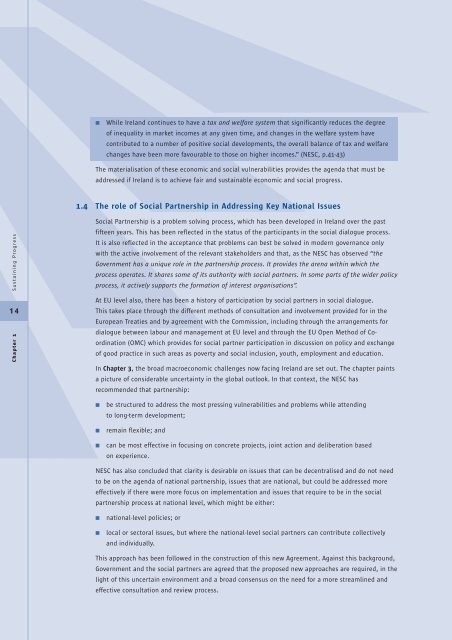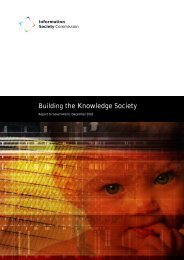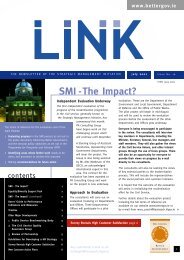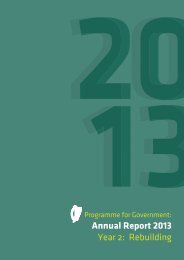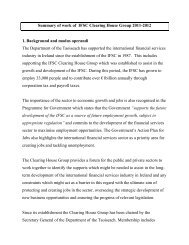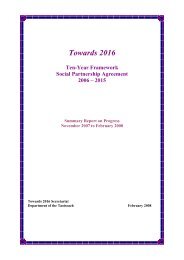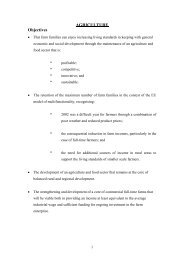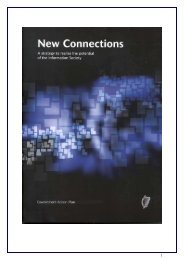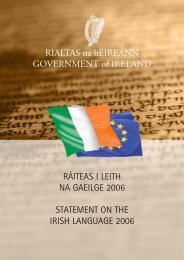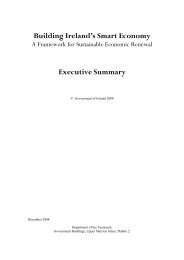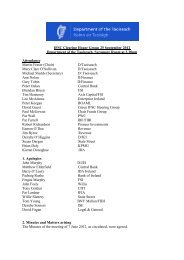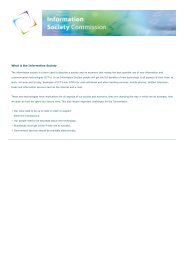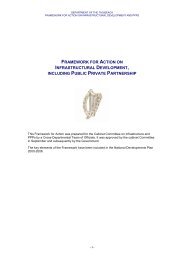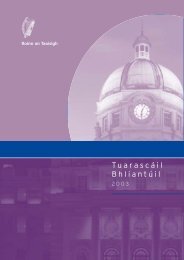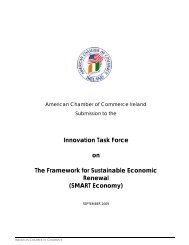Sustaining Progress - Department of Taoiseach
Sustaining Progress - Department of Taoiseach
Sustaining Progress - Department of Taoiseach
Create successful ePaper yourself
Turn your PDF publications into a flip-book with our unique Google optimized e-Paper software.
Chapter 1 <strong>Sustaining</strong> <strong>Progress</strong><br />
14<br />
■ While Ireland continues to have a tax and welfare system that significantly reduces the degree<br />
<strong>of</strong> inequality in market incomes at any given time, and changes in the welfare system have<br />
contributed to a number <strong>of</strong> positive social developments, the overall balance <strong>of</strong> tax and welfare<br />
changes have been more favourable to those on higher incomes.” (NESC, p.41-43)<br />
The materialisation <strong>of</strong> these economic and social vulnerabilities provides the agenda that must be<br />
addressed if Ireland is to achieve fair and sustainable economic and social progress.<br />
1.4 The role <strong>of</strong> Social Partnership in Addressing Key National Issues<br />
Social Partnership is a problem solving process, which has been developed in Ireland over the past<br />
fifteen years. This has been reflected in the status <strong>of</strong> the participants in the social dialogue process.<br />
It is also reflected in the acceptance that problems can best be solved in modern governance only<br />
with the active involvement <strong>of</strong> the relevant stakeholders and that, as the NESC has observed “the<br />
Government has a unique role in the partnership process. It provides the arena within which the<br />
process operates. It shares some <strong>of</strong> its authority with social partners. In some parts <strong>of</strong> the wider policy<br />
process, it actively supports the formation <strong>of</strong> interest organisations”.<br />
At EU level also, there has been a history <strong>of</strong> participation by social partners in social dialogue.<br />
This takes place through the different methods <strong>of</strong> consultation and involvement provided for in the<br />
European Treaties and by agreement with the Commission, including through the arrangements for<br />
dialogue between labour and management at EU level and through the EU Open Method <strong>of</strong> Coordination<br />
(OMC) which provides for social partner participation in discussion on policy and exchange<br />
<strong>of</strong> good practice in such areas as poverty and social inclusion, youth, employment and education.<br />
In Chapter 3, the broad macroeconomic challenges now facing Ireland are set out. The chapter paints<br />
a picture <strong>of</strong> considerable uncertainty in the global outlook. In that context, the NESC has<br />
recommended that partnership:<br />
■ be structured to address the most pressing vulnerabilities and problems while attending<br />
to long-term development;<br />
■ remain flexible; and<br />
■ can be most effective in focusing on concrete projects, joint action and deliberation based<br />
on experience.<br />
NESC has also concluded that clarity is desirable on issues that can be decentralised and do not need<br />
to be on the agenda <strong>of</strong> national partnership, issues that are national, but could be addressed more<br />
effectively if there were more focus on implementation and issues that require to be in the social<br />
partnership process at national level, which might be either:<br />
■ national-level policies; or<br />
■ local or sectoral issues, but where the national-level social partners can contribute collectively<br />
and individually.<br />
This approach has been followed in the construction <strong>of</strong> this new Agreement. Against this background,<br />
Government and the social partners are agreed that the proposed new approaches are required, in the<br />
light <strong>of</strong> this uncertain environment and a broad consensus on the need for a more streamlined and<br />
effective consultation and review process.


